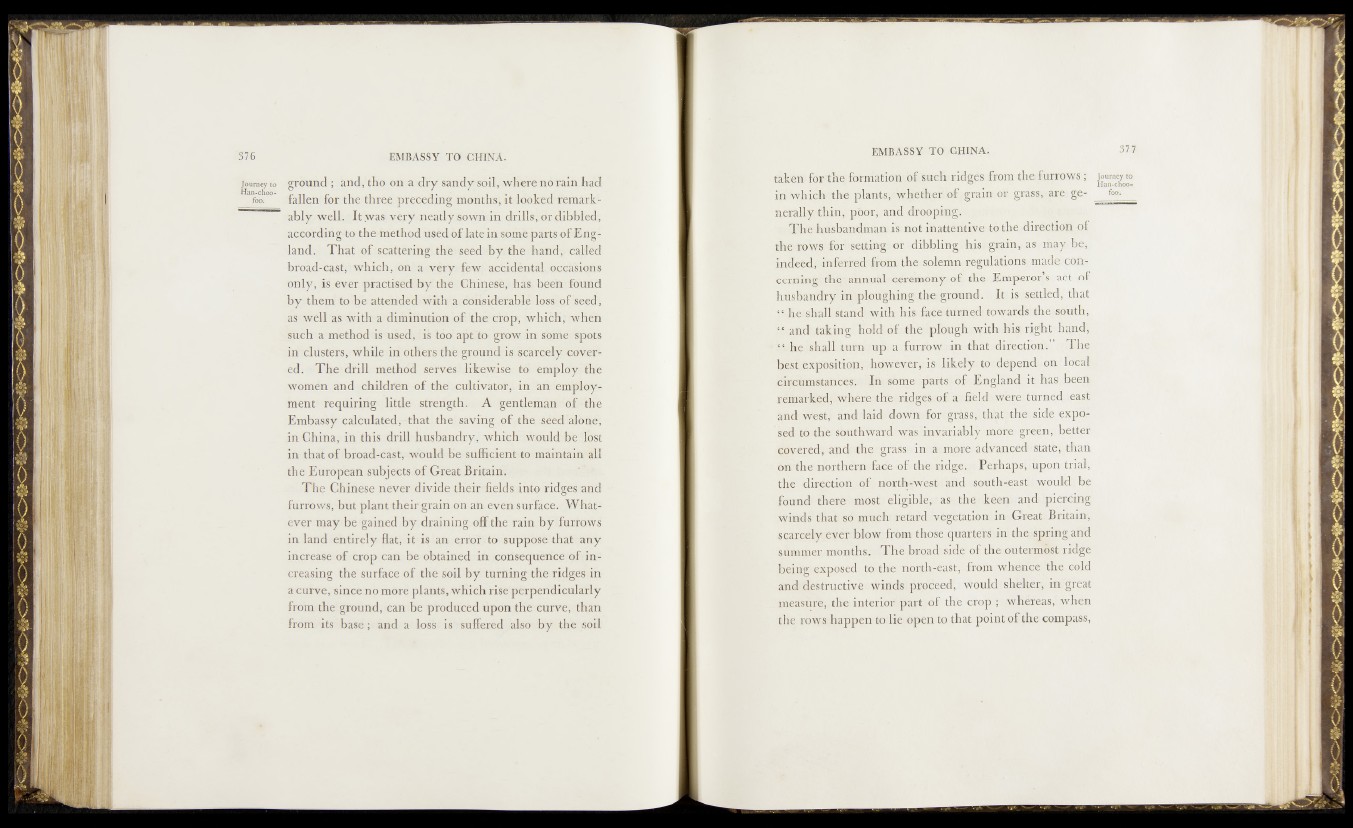
Journey tc
Han-choo- ■F©Öï
ground ; and/thdon a dry sand yrsoily where no rain had
fallen for the three preceding months, i t lo è t e f femaTJt-
ably well. It wa^^ry^neatfey sownan drillsfLdr'disbbled,
aefcordingAo thebnethod used öfdate in some parts of E ng-
lamd® That of .scattering^ thhYèéedi by> the i hand, called
broad-cast,’ which, eura ve ry few accidental, pgQabions
onlyv is ever practised by the Chinese ,<hd&beefn ’ found
by them to ;he attended with a considerable* lossIhf.SSeed j
^ w e l l as with:'B/diihinution of !the5ci'6p, whihK^whe'n
tfuéh a method is used,'“is 'too aptlo grow,in sbme^pots
in "clusters, while in others thfe^dündSstSeaE^el^cbYëfr
èd. The drill method serveswomen
and children of the cultivator,, in an temp toys
ment' requiring little strength. A . gentleman" ufcd#e
Embassy radculatedr that the|saving of the seed alone,
in'China, in this drill husbandry, .which'wonld^bfe wst
in that of broad-cast,_would be-sufficient .to-maintain*’all
the' European subjects!of Giièat Britain.
The Chinese never dividetheir-fields into ridgefend
furrows, but plant their grain on an even surface. ^Whatever
may be gained by draining off.the rain bylfurtaws
in lan dy entirely flat, it is an error. to suppose that- ratey"
increaseof Crop,can be obtained in coiisefjtterice of increasing
the surface of the soil by turning the ridges;in
a curve, since.no more plants, which rise pèrpendicularly
from the ground, can be produced upon the curve, than
from its base; and a loss is suffered also by the soil
takten^£4 r4#^@f#i‘tti@5riibf such’ ridges from thesfurrows; journey to
in ^whkh'^te*pla^%''wtetherbof^ grain ok grasg^a^ej gu-
n©pall^yhiu^p,&0Tband'd%oij|iegiAv;;,:
The^tifebari^teanbibEtof ihattentivj&to the dire-ejionpf
th^ov^ifbrh&efetiag^nr | dibblin g f|| i sf-g-pd n ^ a s ^ a y 1 be*
in:^^d^,^K,fe^'ed, from the Solemn?! pagid%hhSi* m^d|||pm$
corniftgf theig^nn*u a 1 -eeWiiapriyfQ$| th^Tmfii&rQTf s ,aot ,©f
husbandry m'*piop^^®gj‘d h # ^ o vU'nd. * It' is:|||ftlied;>.that
t‘vfte|s|Mll starid v&if||\hf|ifep'eij'iirntowards tbe»;-SQUtb,
^ ^ ^ t a k i n g I itokkof1 fe^ipPoughp^dth'M»^hftrhajt^i
turn up ^fferow^ f^&lydi^eGtion. ’ ’ y,iThe
bhs%expositi<ali, like! ony local
cir#iHlS:tdp|^ jjjLin some parts- S^EogKA'difc.Ms beei^
remarked, ■ eaftidggSffofi atfxfeldsw^g turnedjjeasi
amd'wbst,*- and laiftsf|0f^^%Pf4 rass;dhut^helsidd;exp(i-
sed to th Ci-sbu-th ward: v^|fntva>kil dy'!*itv<'iE«,^ga epn,y b e tt er
4fiVered^a*nd;;4ha^gKass^iii' a m@de| a dvani.ce d^sj®. fcjb^ th an
on' the^nort-hdrn.-.feiGesiof thJejifedgeqtffejskaps 1 iupon trial,
the dir^tio%-hf£ uorbhywsstii and ,sau^a;|^d|#y©uldi be
found ther|«||m0St‘.: elfg^fetash th e . Jteeni /adchipierbing,
winds'thafcso nmehl Te£k?d^e^tat-i©n im^eafr, Britain?,
seareelyse^eri blow frbm thn^^|uartef^in|t^ie spring-anti,
summer-months; Thehead'ssi(^rt>fi1iie,.outermost ridgb?
.exposed tct th e , north-east- from,whemfee :the cold
and-destructive^widfeproileedi^lQuld shbker- irr great
measure, the interior partjppk the,(brep^||whereas-, when
the rowsdaappen to.’MeLbpen to^th^k poinfeof the compass,